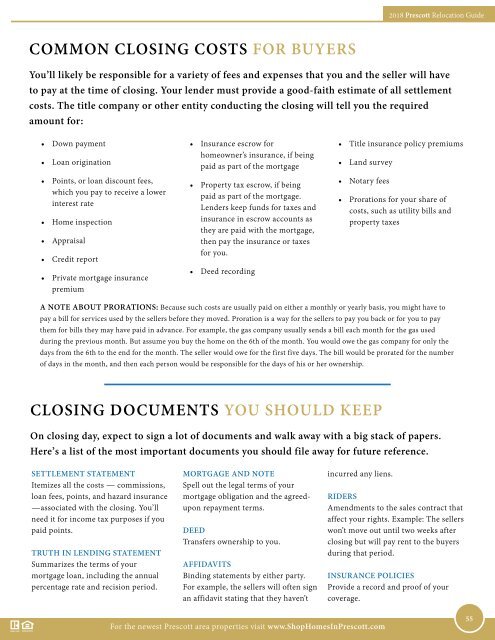2018 Prescott Relocation Guide -The Guedel Team
Create successful ePaper yourself
Turn your PDF publications into a flip-book with our unique Google optimized e-Paper software.
<strong>2018</strong> <strong>Prescott</strong> <strong>Relocation</strong> <strong>Guide</strong><br />
COMMON CLOSING COSTS FOR BUYERS<br />
You’ll likely be responsible for a variety of fees and expenses that you and the seller will have<br />
to pay at the time of closing. Your lender must provide a good-faith estimate of all settlement<br />
costs. <strong>The</strong> title company or other entity conducting the closing will tell you the required<br />
amount for:<br />
• Down payment<br />
• Loan origination<br />
• Points, or loan discount fees,<br />
which you pay to receive a lower<br />
interest rate<br />
• Home inspection<br />
• Appraisal<br />
• Credit report<br />
• Private mortgage insurance<br />
premium<br />
• Insurance escrow for<br />
homeowner’s insurance, if being<br />
paid as part of the mortgage<br />
• Property tax escrow, if being<br />
paid as part of the mortgage.<br />
Lenders keep funds for taxes and<br />
insurance in escrow accounts as<br />
they are paid with the mortgage,<br />
then pay the insurance or taxes<br />
for you.<br />
• Deed recording<br />
• Title insurance policy premiums<br />
• Land survey<br />
• Notary fees<br />
• Prorations for your share of<br />
costs, such as utility bills and<br />
property taxes<br />
A NOTE ABOUT PRORATIONS: Because such costs are usually paid on either a monthly or yearly basis, you might have to<br />
pay a bill for services used by the sellers before they moved. Proration is a way for the sellers to pay you back or for you to pay<br />
them for bills they may have paid in advance. For example, the gas company usually sends a bill each month for the gas used<br />
during the previous month. But assume you buy the home on the 6th of the month. You would owe the gas company for only the<br />
days from the 6th to the end for the month. <strong>The</strong> seller would owe for the first five days. <strong>The</strong> bill would be prorated for the number<br />
of days in the month, and then each person would be responsible for the days of his or her ownership.<br />
CLOSING DOCUMENTS YOU SHOULD KEEP<br />
On closing day, expect to sign a lot of documents and walk away with a big stack of papers.<br />
Here’s a list of the most important documents you should file away for future reference.<br />
SETTLEMENT STATEMENT<br />
Itemizes all the costs — commissions,<br />
loan fees, points, and hazard insurance<br />
—associated with the closing. You’ll<br />
need it for income tax purposes if you<br />
paid points.<br />
TRUTH IN LENDING STATEMENT<br />
Summarizes the terms of your<br />
mortgage loan, including the annual<br />
percentage rate and recision period.<br />
MORTGAGE AND NOTE<br />
Spell out the legal terms of your<br />
mortgage obligation and the agreedupon<br />
repayment terms.<br />
DEED<br />
Transfers ownership to you.<br />
AFFIDAVITS<br />
Binding statements by either party.<br />
For example, the sellers will often sign<br />
an affidavit stating that they haven’t<br />
incurred any liens.<br />
RIDERS<br />
Amendments to the sales contract that<br />
affect your rights. Example: <strong>The</strong> sellers<br />
won’t move out until two weeks after<br />
closing but will pay rent to the buyers<br />
during that period.<br />
INSURANCE POLICIES<br />
Provide a record and proof of your<br />
coverage.<br />
For the newest <strong>Prescott</strong> area properties visit www.ShopHomesIn<strong>Prescott</strong>.com<br />
55



